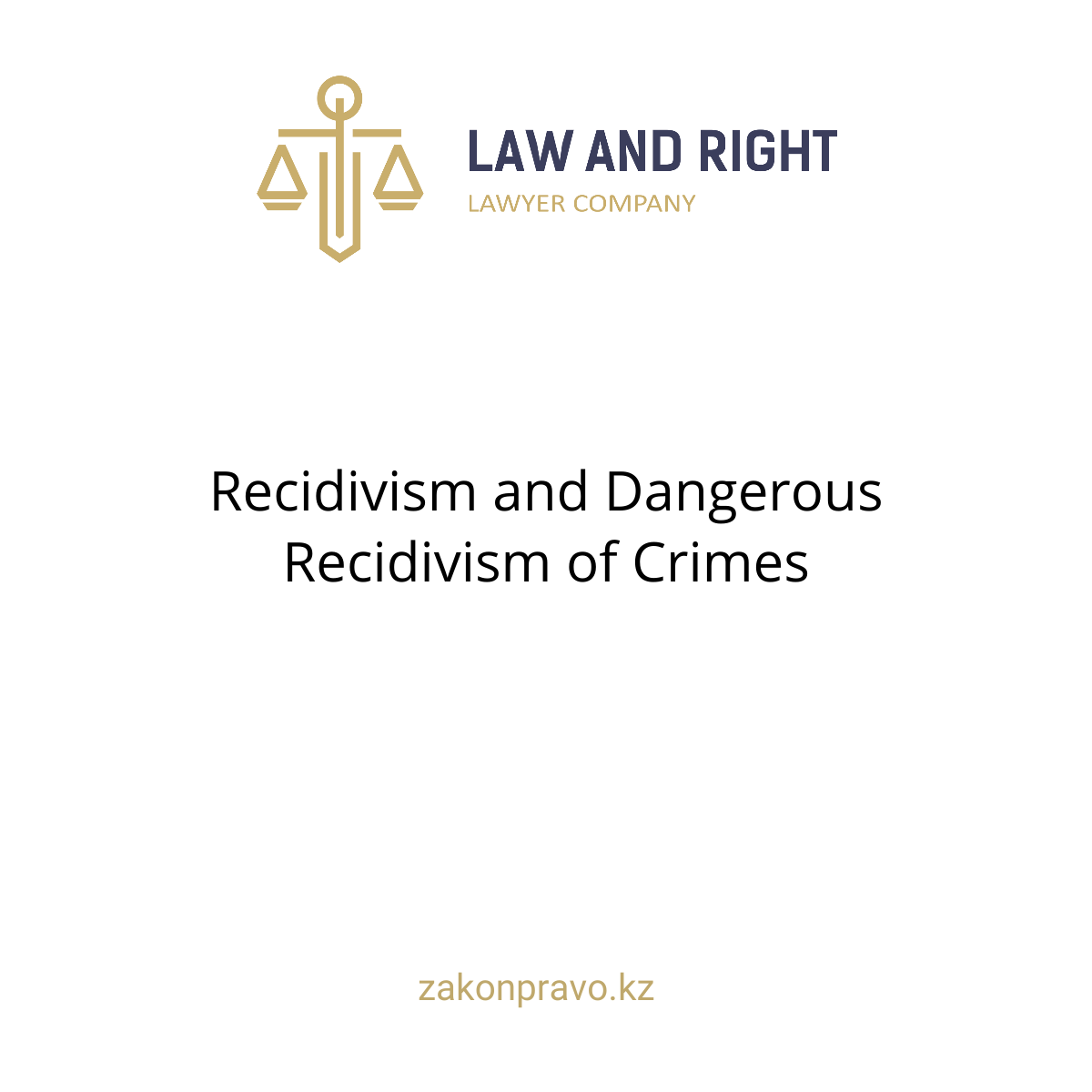Recidivism and Dangerous Recidivism of Crimes
Recidivism refers to the repeated commission of a crime by a person who was previously convicted of a serious or especially serious offense. This concept plays an important role in sentencing and applying stricter criminal liability measures. Below are the relevant legal provisions, explanations, examples of judicial practice, and references to other regulatory acts.
1. Definition of Recidivism
📌 Part 1, Article 14 of the Criminal Code of the Republic of Kazakhstan (CC RK)Recidivism is recognized when a person commits a serious crime after previously being sentenced to imprisonment for a serious crime.
🔹 Criteria for Recidivism:
Commission of a serious crime;
Previous conviction for a serious crime;
Previous punishment involved imprisonment.
📌 Example 1:An individual was sentenced to 5 years in prison for robbery (Part 2, Article 192 of the CC RK – a serious crime). After serving the sentence, the person commits a violent theft (Part 2, Article 191 of the CC RK – also a serious crime). In this case, recidivism is established.
📌 Judicial Practice:In Normative Resolution No. 1 of May 11, 2007, the Supreme Court of the RK clarified that recidivism is only considered if the previous crime was serious and the punishment included actual imprisonment. If the person was previously given a suspended sentence or corrective labor, recidivism is not recognized.
2. Definition of Dangerous Recidivism
📌 Part 2, Article 14 of the CC RKDangerous recidivism is established in two situations:
1️⃣ Commission of a serious crime, if the person has previously been imprisoned twice for serious crimes, or has a conviction for an especially serious crime.2️⃣ Commission of an especially serious crime, if the person has previously been imprisoned for a serious or especially serious crime.
📌 Example 2:An individual has served time for two serious crimes (robbery – Article 192 of the CC RK, drug trafficking – Article 297 of the CC RK). Later, they commit another serious crime – negligent homicide (Article 104 of the CC RK). In this case, dangerous recidivism is recognized.
📌 Judicial Practice:In Case No. 2-645/2022, the Supreme Court clarified that dangerous recidivism is recognized only if the punishment for the previous offense was actually served. If the person was released under amnesty or parole but the conviction remains unexpunged, recidivism is still valid.
3. Exceptions: When Recidivism Is Not Considered
📌 Part 3, Article 14 of the CC RK states that the following are not considered recidivism:✔️ Crimes committed before the age of 18.✔️ Expunged or removed convictions (Article 79 of the CC RK).
🔹 Expungement – occurs after a specific period following the completion of the sentence (e.g., 6 years for serious crimes – Article 79 of the CC RK).🔹 Removal – may occur early by court decision based on exemplary behavior.
📌 Example 3:A person committed a serious crime at age 16. After the conviction was expunged, they committed another offense. In this case, recidivism is not taken into account.
📌 Judicial Practice:In Normative Resolution No. 4 of June 25, 2021, the Supreme Court stated that if the conviction is removed or expunged, recidivism is not recognized even if a similar crime is committed afterward.
4. Consequences of Recidivism and Dangerous Recidivism
📌 Part 4, Article 14 of the CC RK provides that recidivism leads to stricter sentencing.
🔹 Key consequences:
Harsher penalties (Article 58 of the CC RK);
Ineligibility for suspended sentences (Part 4, Article 63 of the CC RK);
Increased likelihood of special measures (forced treatment, limited eligibility for early release).
📌 Example 4:If a person previously convicted of a serious crime commits another serious crime, they may be sentenced without eligibility for parole (Article 72 of the CC RK).
📌 Judicial Practice:In the Supreme Court’s resolution of November 15, 2023, it was stated that in cases of recidivism, the court cannot impose a sentence below the minimum prescribed by law unless exceptional circumstances are established.
5. Difference Between Recidivism, Multiple Offenses, and Cumulative Crimes
| Feature | Recidivism (Art. 14) | Multiple Offenses (Art. 12) | Cumulative Crimes (Art. 13) |
|---|---|---|---|
| Number of crimes | At least two | Two or more | Two or more |
| Prior offense | Convicted | Not convicted | Not convicted |
| Relation to prior offense | Sentence served | Before conviction | Before conviction |
| Example | A person served a sentence for theft, then committed another theft | Committed two thefts before being arrested | Committed theft and fraud |
📌 Important:The Supreme Court, in Normative Resolution No. 7 of June 15, 2018, clarified that recidivism does not apply if the crimes were committed as part of the same criminal group.
6. Final Conclusions
🔹 Recidivism – repeated commission of a serious crime if the person was previously imprisoned for a serious crime.🔹 Dangerous recidivism – repeated commission of especially serious crimes or two consecutive serious crimes.🔹 Recidivism is not considered if the prior conviction was expunged or the offense was committed before the age of 18.🔹 Consequences – harsher sentencing, ineligibility for parole.🔹 Judicial practice shows that recidivism affects the severity of the sentence, but it does not automatically lead to the maximum term.
📌 Practical significance: Proper recognition of recidivism helps prevent errors in legal qualification and sentencing.
Attention!
Law and Law Law Law draws your attention to the fact that this document is basic and does not always meet the requirements of a particular situation. Our lawyers are ready to assist you in legal advice, drawing up any legal document suitable for your situation.
For more information, please contact a Lawyer / Attorney by phone: +7 (708) 971-78-58; +7 (700) 978 5755, +7 (700) 978 5085.
Attorney at Law Almaty Lawyer Legal Services Legal Advice Civil Criminal Administrative Cases Disputes Protection Arbitration Law Firm Kazakhstan Law Office Court Cases


